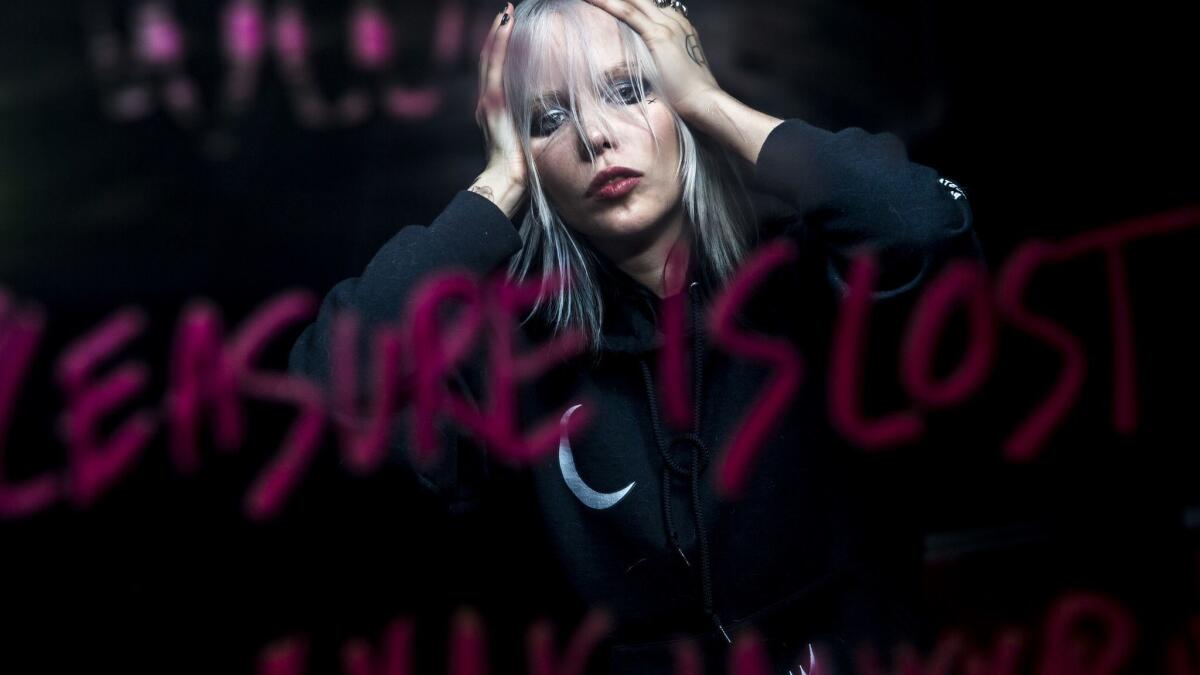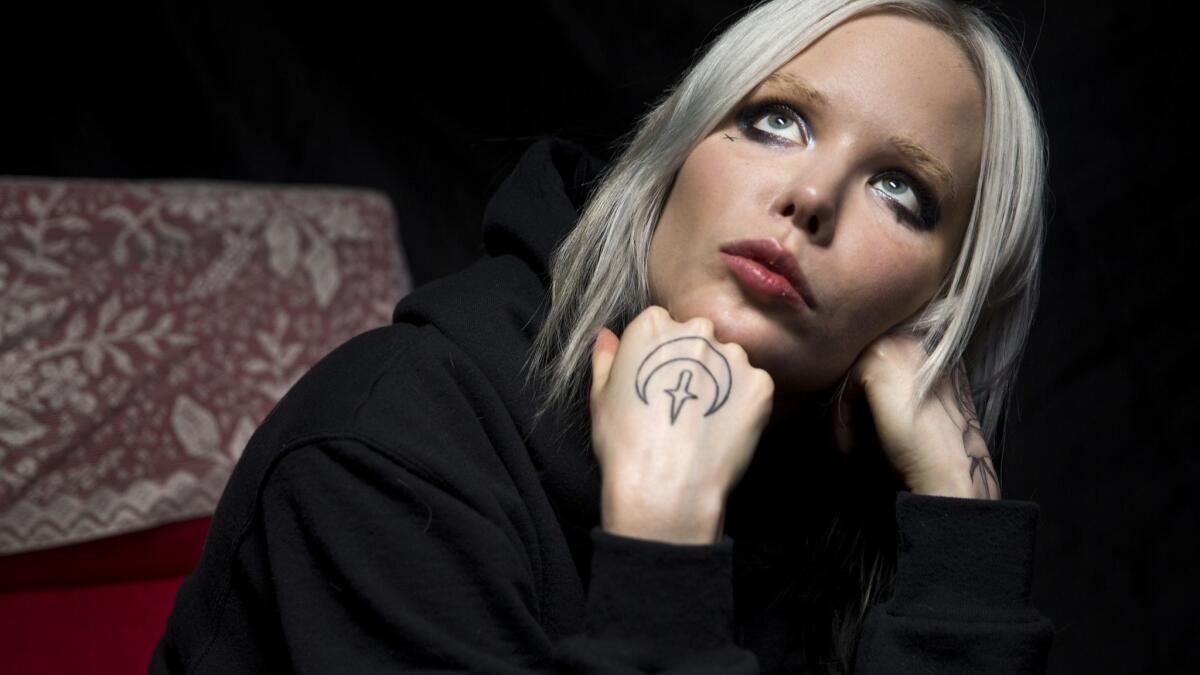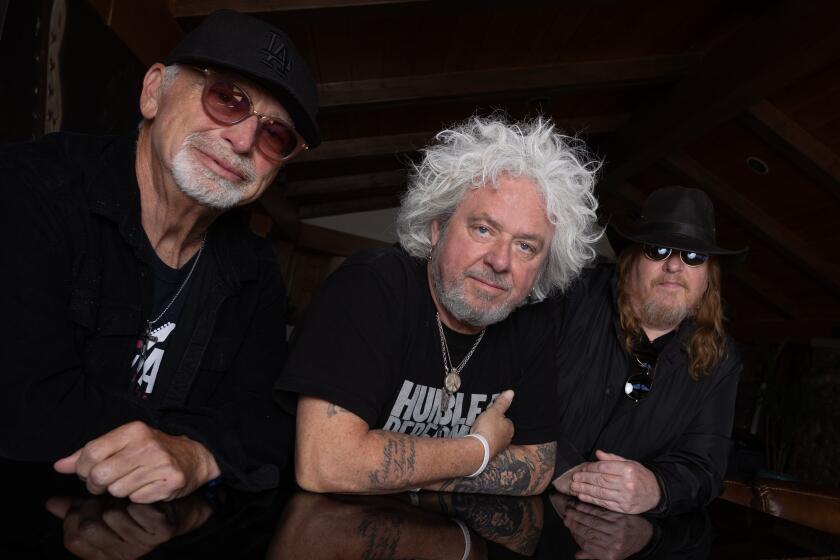Alice Glass is living in silence no more, as new music opens — and heals from — old wounds

“Oh, look — I’m bleeding,” Alice Glass says as she holds up her forearm in the living room of her Los Angeles home to inspect a new tattoo.
The bright red heart above her wrist, freshly bandaged in plastic wrap, is oozing streaks of blood. Yet the 29-year-old musician remains unfazed, turning her attention instead to the dead mouse cradled in her other hand — one of several taxidermied rodents that will star in her next music video.
“Isn’t it cute?” she coos. In a sense, the tattoo is not the only wound she is waiting to heal.
The former frontwoman of electro-punk duo Crystal Castles, Glass made national headlines in October when she accused ex-bandmate Ethan Kath (real name: Claudio Palmieri) of physical and sexual abuse.
Her first record as a solo artist, a self-titled six-track EP released last summer, grapples with the aftermath of the relationship. Starting this week, she will perform those songs — along with older material and new tracks from a forthcoming album — on her U.S. tour with Zola Jesus, which kicks off Thursday at the Teragram Ballroom.
Toronto-born Glass, whose real name is Margaret Osborn, stalked into the indie music scene with Crystal Castles in 2006 like a screeching stray cat, captivating crowds with brutally raw performances where she would climb speakers and scream, sometimes indecipherably, against crashing waves of electronic distortion. The band’s abrasive approach to pop-rock set it apart from mid-2000s peers — in fact, Crystal Castles described itself as “an axe in the face of emo.”
In 2014, after three albums and several world tours, Glass left Crystal Castles for unspecified reasons. She returned the next year with a single called “Stillbirth,” donating the proceeds to victims of sexual violence. In October 2017, as the #MeToo movement was gaining momentum, Glass published a statement on her website detailing her allegedly abusive relationship with Kath, which she claimed began when she was 15.

“The momentum that’s been created recently by the many courageous women who have opened up about their own stories has inspired me to finally be more direct, at whatever cost,” Glass wrote. In response, Kath, who denied the allegations, filed a defamation suit.
Los Angeles Superior Court documents show the suit was dismissed this spring. (Henry Gradstein, an attorney for Palmieri, said there is a May 16 hearing to contest the dismissal and “we expect to prevail.”)
Coming out with her story wasn’t easy, says Glass.
“I didn’t want to have to go to court,” she says.
Since breaking her silence, Glass says she’s connected with other women in the music industry with similar experiences, which has helped her feel less alienated. “It’s like this shared pain that we don’t know we can have with another human being, until we talk about it,” she says. “Or we can live in silence forever.”
Glass says she spoke up in order to elucidate how abuse is rife in the music industry, especially among underage musicians from broken homes with few resources for support.
“It isn’t just Hollywood or Bill Cosby,” she says. “It could be some guy who sends you songs, says you’re really talented and wants to start a band with you.”
If her story can help protect others from abuse, she adds, “it kinda makes it seem like all your suffering wasn’t pointless.” On her recent EP, Glass excavates her long-buried trauma, picking it apart with excruciating sensitivity as she wrestles with residual feelings of confusion, depression and guilt.
“Am I worth it or am I worthless? And will I ever figure it out?” she sings in the opening lines of “Without Love.” A few verses later, she arrives at a conclusion. “Got to be without love,” she sings in the hook, repeating it over and over like a mantra.
“I haven’t had the best experiences with trusting people and opening myself up to them, so it’s better just to be closed off and try not feel anything at all,” she says, sitting on the red carpeted floor of her basement studio — a womb-like cave littered with effects pedals, sample pads, drum kits and microphones. “It’s all about sacrificing yourself so that you can’t for someone else. You damage your own goods before someone else can.”
On the single “Cease and Desist,” which she described as a “call to arms for all survivors,” Glass turns defiant as she wails amid industrial guitar riffs: “Promise me you’re never the victim / Promise me you have to fight.” On the stripped-back “Natural Selection,” she simply screams, “Get the … off of me,” between furious screeches and gaping voids of silence.
“I think I’m a little confused about my emotions, and I’m figuring it out as I go along,” Glass says of the many shifting sentiments on her EP. “I didn’t know what I wanted to say as an artist when I first started, so the first couple years was about easing out of trauma by writing songs as a coping mechanism.”
For the first few years after she left the band, Glass says she found it difficult to listen to her previous songs. “I couldn’t even sing some of them. It just made me cry,” she says. “I wanted to start everything as a new artist and erase my past completely.”
But she couldn’t bear to negate all the time and effort she poured into writing and promoting those songs. “From my teens till my mid-20s, I was always on the road. I didn’t have friends, a phone or a social life,” she says. “When I listen back now, I think about where I was at that place in my life and how hard I worked.”
Part of the process of coming into her own involved unmasking her voice, which was often buried and dehumanized under layers of reverb and distortion in her Crystal Castles work. “Everything I used to do was a little monotone, whether it was screaming or singing,” says Glass. “I wasn’t sure what I could do, what my voice was capable of.
“There was a part of me that was afraid to show people that I wasn’t this one-dimensional human being. Putting yourself out there and being vulnerable, you can’t take it back.”
She says this next part slowly, choosing her every word.
“I just want to be able to be a human being and be flawed — that’s more important to me than having strangers think I’m cool.”
A self-conscious laugh escapes from her throat. Then she tucks her chin, gazes to the ground and says in a voice so soft it’s almost a whisper, “That sounds dorky, but it’s… the truth.”
♦ ♦ ♦ ♦ ♦ ♦ ♦ ♦ ♦ ♦
Alice Glass with Zola Jesus and Pictureplane
When: 8 p.m April 26
Where: Teragram Ballroom, 1234 W. 7th St.
Price: $25
Info: www.teragramballroom.com
More to Read
The biggest entertainment stories
Get our big stories about Hollywood, film, television, music, arts, culture and more right in your inbox as soon as they publish.
You may occasionally receive promotional content from the Los Angeles Times.










